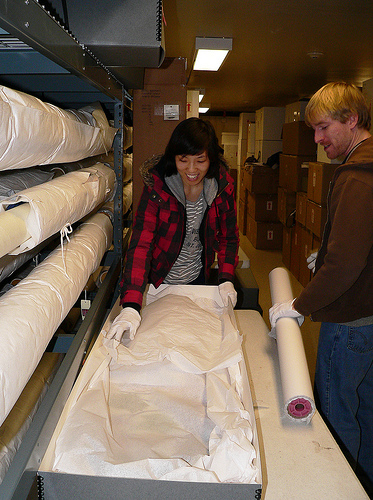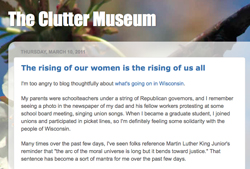As promised, here’s another mini-rant, or rather series-of-questions-whose-answers-would-likely-lead-me-to-mega-rant. And with this one, I’d really like your assistance.
Because I’m one of only two faculty in my department whose specialty is officially “public history”—mind you, we all practice one form of it or another, but I have been anointed by my position description—pretty much all the applications for admission to our Master’s in Applied Historical Research program come across my desk. Usually I just write a few notes explaining why I’m recommending we admit the candidate, admit hir provisionally, or decline to admit hir, and then that’s the last I see of the application. I also don’t get to see my colleagues’ comments on the application, as that might unduly bias me.
Occasionally, however, an application comes back to me when individual faculty make conflicting recommendations about admission. So, for example, I might say we should admit someone, but two or three of my fellow faculty recommend the opposite. In many departments, a majority “no” vote might be the end of the line for an application, but our graduate program director gives me (or anyone else whose vote differs, I’m assuming) the opportunity to reconsider the application, to change my vote or take a stand or something in between.
At such moments, I get to see the admissions recommendations and, more importantly, the comments of my fellow evaluators. And often I’m in complete agreement with what they’re saying about the application, but I still want to recommend the opposite of what they do.
I’m not sure why, but it took me a year and a half in the department to realize that our occasionally differing visions about who should be admitted to the program stem from our–wait for it–differing visions about the program’s capabilities and mission.
My friends, we lack collective clarity.*
See, we have two programs: a traditional M.A. in history, and the M.A.H.R. The department’s web page describes the programs using almost exactly the same language, differentiating between the two only by saying the M.A. will prepare students for work in academic settings at all levels (by which I assume we mean high school teaching or the occasional adjunct gig) and the M.A.H.R. prepares students for careers outside academic settings. Programmatically, the degree requirements differ very little, with M.A.H.R. students taking one additional seminar in public history—but when I taught that course last spring, there were several M.A. students in it, too. The M.A.H.R. students can substitute “skills” courses (like GIS or video editing) for the foreign language courses required of the M.A. students. The M.A.H.R. students are also allowed, and encouraged, to take more internship credits.
If you’ve been around the history graduate program block lately, maybe you’re reading this as I do: the M.A.H.R. program is about helping students take very specific steps toward getting jobs. The M.A. program. . .maybe not so much. I don’t work with the M.A. students much, so I’m not sure what they want out of the program, but the M.A.H.R. students often have very specific goals: to open a historical consulting firm, to go into museum exhibit development, to make a documentary film, to apprentice themselves in a historic preservation office.
My latest (implied) rant took the form, then, of a memo to the graduate program coordinator in which I asked these questions (and provided my own tentative answers):
- Should the students applying to the M.A.H.R. program have the same preparation and/or potential as students applying to the M.A. program?
- If not, should we differentiate the application process for the M.A. and M.A.H.R. programs?
- If we differentiate the applications, is a 15-20 page, traditional academic essay the best way to gauge preparedness for the M.A.H.R. program? If not, what is?
- If we do away with the academic essay requirement for M.A.H.R. students, how will they demonstrate their ability to work with primary and secondary sources?
Here’s the thing: I read a lot of mediocre writing in those applications, from both M.A. and M.A.H.R. applicants. Many of the objections from my colleagues stem from applicants’ bad writing or poor research skills. And in my own classes, I’m a pretty unforgiving taskmaster when it comes to writing. So I’m not suggesting that we lower to the admissions bar for M.A.H.R. applicants. Yet maybe we need to acknowledge that public historians’ work embraces a huge spectrum; some public historians might find themselves addressing K-6 students, while others work primarily with policymakers. On the job, some will rarely write anything longer than an exhibit label. Others will need to write eloquently in grant proposals. Many will need to do both.
I suspect that many of the applicants who can’t write a good enough academic essay to be admitted to a traditional academic programs can still engage in critical and creative thought–it’s just that the essay isn’t the best way for them to exhibit these skills. Someone who is a good fit for our M.A. program might not be a good fit for the M.A.H.R. program, and vice versa. I suspect we faculty have been treating applicants as if they’re applying to the same program.
The grad program coordinator told me to bring my questions and concerns to the faculty at a department meeting. Our faculty meetings are relatively fleet things, thank goodness, but it also means I need to find a way to encourage people to either (a) coalesce around a unified vision in, oh, 10-15 minutes or (b) reflect on what they think the difference between the two programs should be and share their individual visions with me before the next meeting.
Of course, before I do that, I’d like some information from other programs. I’ll be scouring departmental web pages and perhaps contacting some folks, but in the meantime, here’s what I’d like from you, dear readers:
If you teach in, or pursued a degree within, a humanities or social science department that offers to graduate students an “academic” track and a “practical” or “non-academic career” track, how do you differentiate between applicants to the two programs? Do you require essays or something else? Do you require interviews? Do you expect applicants to propose specific projects? Do you ask recommenders to comment on the applicants’ career potential instead of just their academic performance? How can you tell which applicants might be a better fit for one degree track over another?
Please share your experiences in the comments. I know many of you maintain your anonymity on the interwebz, so you can either obfuscate a few details, comment anonymously, or you can e-mail me privately at trillwing -at- gmail -dot- com.
Many thanks!
* . . .in an academic department. A stunning revelation, I know.
Photo by vlasta2, and used under a Creative Commons license.



back in the day, when I got my Ph.D. at UCLA, one could apply to a join Masters in Lib Sci and MA history program. The skill gaps was huge, and as you note, the joint MA stus were held to the standards of the peeps pursuing Ph.Ds in history. I still remember as the single most cringeworthy incident of grad career this person from the joint program being put on the spot in the most pointed way possible and not let off even when it was clear that s/he could not possible answer the question being posed. It was my impression that those stus were admitted via Lib sci and rubber stamped by history. This process did no one any favors obv. So I guess my answer to your question is that unless you can get all the faculty to recognize that different programs have different criteria for what stus need to be able to do to succeed then even admitting stus on different basis may not “fix” things and may ultimately be cruel to stus who are expected to perform to criteria set by “purely” “traditional” academics.
Sorry that I didn’t see this sooner, Leslie.
My department like yours has M.A. tracks in both traditional and public history. We do not discriminate in terms of admissions requirements between the two–but this may also be in part because our students, whatever their concentration, all earn M.A.s, whereas it looks like your dept. is granting two different degrees.
My observation is that having the same admissions requirements and not differentiating between and among students makes the program as a whole stronger. In fact, all of our students end up getting at least some public history training, which is all to the good in my view, and many of our “traditional” history M.A. students wind up switching tracks and concentrating in public history.
I absolutely take your point that public historians often have dfferent audiences for their writing than traditional M.A. students who might go on to get a Ph.D. But I think strong writing skills are strong writing skills, and it’s easier for people who can write successfully for different audiences to write successfully for different audiences, if you follow my drift. Now, of course, we don’t expect people to be brilliant and perfect writers from day one, and we see that developing their writing skills is one thing we can do for our students that will serve them well in any future eneavor.